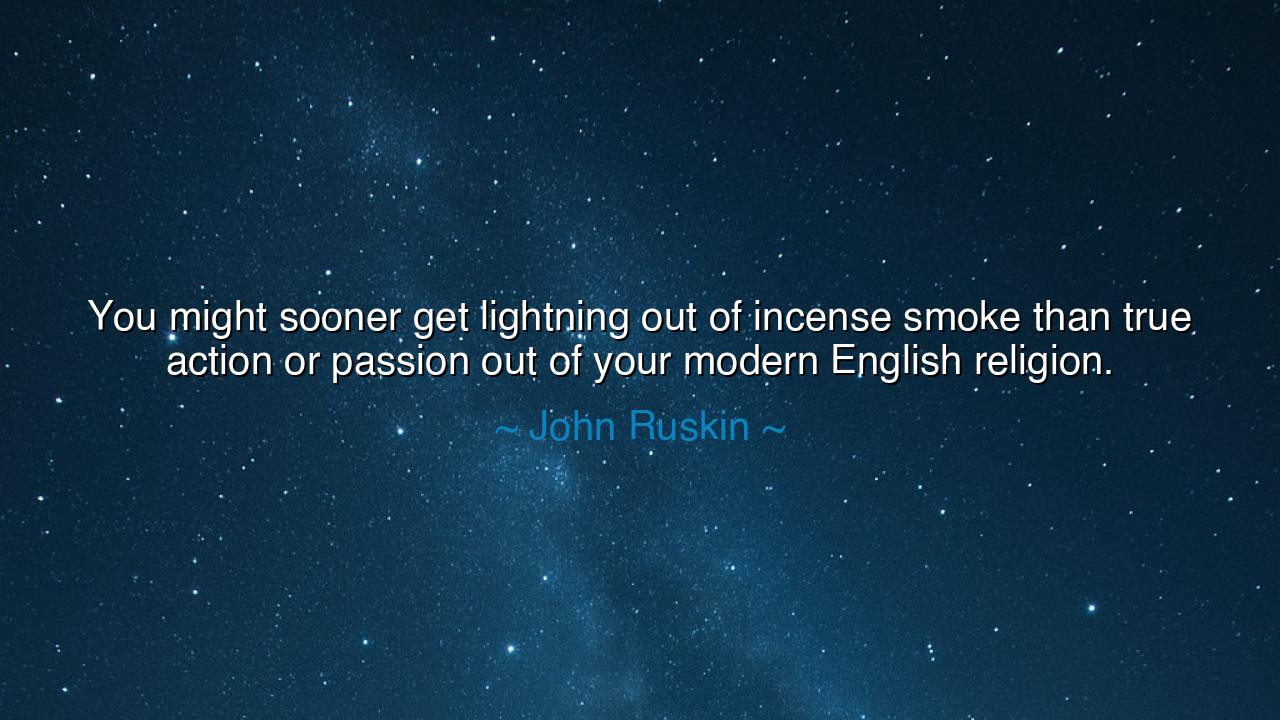
You might sooner get lightning out of incense smoke than true
You might sooner get lightning out of incense smoke than true action or passion out of your modern English religion.






The words of John Ruskin—“You might sooner get lightning out of incense smoke than true action or passion out of your modern English religion.”—strike with the sharpness of both satire and sorrow. He likens the faith of his age to incense smoke: pleasing in fragrance, delicate in form, rising gracefully in the air—yet utterly powerless to stir the heavens. Lightning—the fierce force of nature, the symbol of divine power and transformative energy—cannot be summoned from smoke. In the same way, Ruskin declares, no true passion or deed can be drawn from a religion that has grown too polite, too ritualistic, too hollow to ignite the fire of the human heart.
The origin of this critique lies in Victorian England, a society rich in outward displays of piety but often cold in moral courage. Churches were filled, hymns sung, and incense burned, yet Ruskin, the great art critic and social thinker, saw little evidence of that faith producing justice, compassion, or transformation. He watched as industry consumed workers, as poverty spread in cities, as wealth and power multiplied alongside spiritual complacency. To him, modern English religion had become a shell of itself—ceremonial, comfortable, respectable, but lacking the thunder of conviction and the flame of sacrifice.
History gives us an earlier mirror of Ruskin’s lament. In the final days of ancient Rome, when rituals multiplied but virtue waned, the temples smoked with offerings while the empire crumbled from within. Religion, divorced from moral action, became mere performance, powerless to save the society it adorned. Ruskin’s words suggest that his own England risked repeating that fate: incense without lightning, form without fire, faith without works.
Yet the fire he demanded was not one of destruction, but of passion—the kind that drives men and women to clothe the poor, to defend the oppressed, to build beauty and truth in their cities and art. True religion, in his vision, was never meant to be a soft perfume floating in the air, but a living power that crackles like lightning, illuminating the night and shaking the soul into movement. Without such action, religion is but smoke, pleasing to the eye but vanishing into nothingness.
The heart of his rebuke is a call to authenticity. For Ruskin, ceremonies and words matter only when they awaken the spirit to true action. To sing hymns but ignore the hungry, to pray loudly but pass by the suffering, is to reduce faith to incense smoke: ornamental, sweet-smelling, and utterly without force. His metaphor demands that religion return to its roots, where belief is not proved in ritual alone but in the deeds it produces.
The lesson for us is timeless: do not mistake appearance for substance, nor ritual for righteousness. Seek to live a faith—or a philosophy—that is more than smoke. Ask yourself: does my belief ignite lightning in my life? Does it move me to compassion, courage, justice, and love? Or is it a fragrance that pleases for a moment but leaves the world unchanged? The worth of any creed is not measured in words but in the power it brings forth in the lives of those who hold it.
Practically, this means choosing deeds over mere declarations. If you pray, let your prayer drive your hands to service. If you speak of love, let your words become acts of kindness. If you claim truth, let your life bear witness to it, even when it is costly. For only then will your faith or philosophy cease to be smoke and become lightning—alive, vibrant, transformative.
Thus, Ruskin’s words, though sharp with rebuke, shine as a torch of challenge: religion without action is incense without lightning. Let us, therefore, kindle in our lives the fire of passion and the courage of true deeds, so that our beliefs may not drift away like smoke, but strike like lightning, illuminating both our own souls and the world around us.






AAdministratorAdministrator
Welcome, honored guests. Please leave a comment, we will respond soon